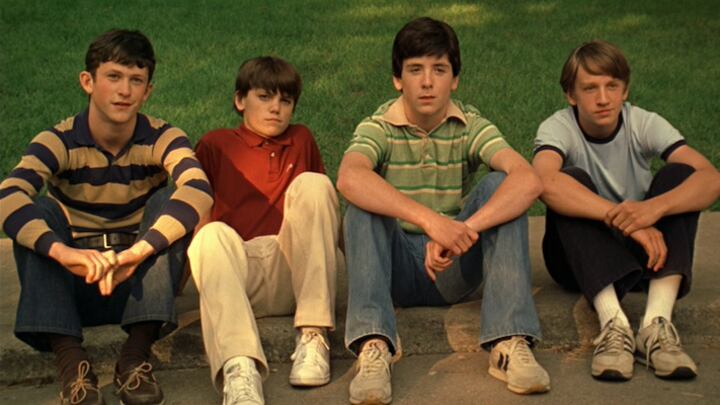Midway through The Virgin Suicides (1999), Trip Fontaine (Josh Hartnett) turns to his father (Peter Snider) for advice about his high school crush, Lux Lisbon (Kirsten Dunst).
“You just need to talk to her at school, you know, about anything. About the weather or school assignments,” Trip is told. “Um, you know, anything to have the chance to communicate with the language of eye contact. And, uh, project confidence.”
That’s not terrible advice, but Trip just stares helplessly. How come Dad doesn’t get it? This girl is a goddess! Talking to her is tantamount to rocketing to another galaxy.
It’s a testament to writer-director Sofia Coppola, who adapted the film from Jeffrey Eugenides’ 1993 novel, that this moment thrums with authenticity. The Virgin Suicides has been rightly proclaimed a feminist rallying cry, but Coppola doesn’t get enough credit for her profound understanding of masculine desire, desperation and delusion.
That understanding will be splashed across the big screen in 35 mm this weekend at 5th Avenue Cinema, which is screening a double feature of The Virgin Suicides and The Bling Ring, Coppola’s 2013 delightfully trashy, truth-based saga of thieving Los Angeles teens.
Both films are populated with compelling female characters, from Kathleen Turner’s tragically monstrous matriarch in Suicides to Katie Chang’s mesmerizingly opaque schemer in Bling. The twist? Coppola observes these women through the male gaze—while studying the men (and boys) behind that gaze with a forthrightness that male directors too rarely achieve.
In The Virgin Suicides, the dance of perspectives is shaped by a nameless narrator (Giovanni Ribisi) speaking for a group of boys in an upper-middle-class suburb of Detroit during the ’70s. Through their eyes, we encounter the Lisbons, five adolescent sisters living under the reign of an adrift father (James Woods) and a tyrannical mother (Turner).
When a tryst between Lux and Trip leads to a ferocious parental crackdown—the girls are placed under virtual house arrest—the boys fantasize about leading a heroic rescue. “We got a car, a full tank,” one crows over the phone. “We’ll take you anywhere you want to go.”
When they later learn the sisters have killed themselves, they are both horrified and baffled. How could the Lisbons end their lives? They were about to be saved! The boys can’t comprehend how paltry their chivalry seemed in the face of misogynistic oppression.
A similar lack of self-awareness bedevils Marc (Israel Broussard) in The Bling Ring, based on a 2010 Vanity Fair article. Lonely and desperate for friendship, Marc becomes a wingman to Rebecca (Chang), the only student at his new school who shows him a trace of kindness.
Rebecca also has a hobby of robbing the likes of Lindsay Lohan and Paris Hilton. Apparently motivated by absolute greed, she’s a defiantly difficult-to-like character akin to Leonardo DiCaprio’s deliberately one-dimensional Jordan Belfort in The Wolf of Wall Street.
If Marc is driven by love and loyalty, not materialism, does that make The Bling Ring unfair to its female characters? Not if Coppola is defending Chang’s right to embody a joyously shallow and villainous young woman—and Broussard’s right to play an emotionally vulnerable young man.
In 2011, Manohla Dargis and A.O. Scott wrote in The New York Times, “The movies may be male dominated, but images of men are surprisingly narrow.” That’s still true, and it’s why Broussard’s performance still seems radical.
Marc is gay, but his friendship with Rebecca is as impassioned as a romance. “She was the first person I felt like was my best friend….I loved her almost as a sister, that’s what made this situation so hard,” he says. It’s so rare for a male character to talk about his feelings so clearly and honestly that when Broussard speaks those words, they strike like a thunderclap.
Neither The Virgin Suicides nor The Bling Ring reaches the emotional heights of Coppola’s 2003 Tokyo odyssey Lost in Translation, but both are worthy installments in her decadeslong study of American masculinity.
She’s still writing new chapters in that story. Last year, she directed On the Rocks (streaming on Apple TV+), starring Rashida Jones as Laura, a writer coping with a chauvinistic father (Bill Murray) and a workaholic husband (Marlon Wayans).
Laura initially believes her father’s self-justifying logic: that men are animals incapable of treating women with respect. Yet by the third act, she’s had it. “You are not an animal with no self control,” she tells him. “You can control your own behavior.”
In that moment, you can feel Coppola speaking through Laura. If she seems to understand men better than they understand themselves, it’s not just because she sees more and knows more. It’s because she expects more.
SEE IT: The Virgin Suicides and The Bling Ring screen at 5th Avenue Cinema, 510 SW Hall St., 503-725-3551, 5thavecinema.com. The Virgin Suicides: 7 pm Friday-Saturday, 3 pm Sunday; The Bling Ring: 9:30 pm Friday-Saturday, 5:30 pm Sunday; April 29-May 1. $4-$5. Free for Portland State University students, alumni and faculty.
